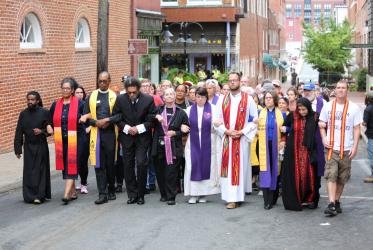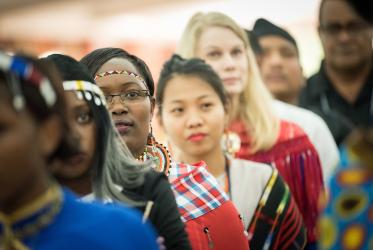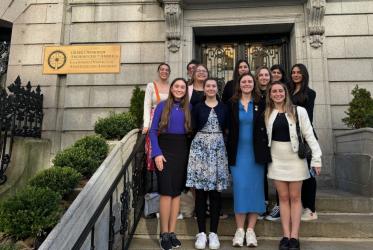In the Washington DC region on 18 April, Jim Winkler, general secretary of the National Council of the Churches of Christ in the USA (NCCCUSA), welcomed a contingent from the World Council of Churches (WCC) who, with others, will be spending 18-25 April on a WCC-sponsored racial justice listening and support visit to several US communities which have suffered violent incidents related to race.
Winkler facilitated a day of introductions, reintroductions and conversation with Rev. Dr Jim Wallis of the Sojourners Community, officials of the US State Department whose duties focus on religious freedom and race, as well as with the long-time president and chief executive officer of the Leadership Conference on Civil and Human Rights.
Seven visitors from the WCC and two of their hosts from the NCCCUSA joined in the talks, led by WCC moderator Dr Agnes Abuom of Kenya and general secretary Rev. Dr Olav Fykse Tveit of Norway. Other WCC delegates from diverse nations, including the USA, will join the team as they travel to Charleston, Saint Louis and Chicago.
Some details of the day’s conversations were private, exploring possibilities and brainstorming informally about approaches that may be undertaken in the WCC journey itself and within the larger context of US society. A report on the visit will be submitted to the WCC Central Committee when it meets in late June at Trondheim in Norway.
Progressive evangelical leader Jim Wallis of Sojourners is the author of America’s Original Sin: Racism, White Privilege, and the Bridge to a New America (Baker Publishing, 2016). He discussed the contemporary state of race relations at an early-morning encounter with the WCC group.
"We have to address our country’s racial injustice and the fundamental difference of opinion and perspective between white and black people about the criminal justice system, education, and economics,” said Wallis.
“We still see racism as a problem that other people have that we can help to fix. We don’t see it in ourselves. It is too easy to point fingers at racism ‘out there.’ It demands much more of us to look in ourselves and see what kinds of prejudices we are carrying around."
At the US Department of State, the ecumenical team engaged with Ambassador David N. Saperstein, ambassador-at-large for international religious freedom; Dr Shaun Casey, special representative for religion and global affairs; and M. Arsalan Suleman, acting special envoy to the OIC (Organization of Islamic Cooperation).
Suleman led a lively discussion concerning the Marrakesh Declaration on the protection of the rights of religious minorities in Muslim lands, and its potential as a first step in securing equal rights for all minorities. This led to an account of the WCC’s involvement in promoting better relations among Christians and Muslims, including efforts that have been made in Nigeria and other scenes of tragic hostility and killings.
Tveit stressed the necessity of a sharper focus on instances of violence perpetrated in the name of religion. This dynamic should be recognized and opposed by religious bodies themselves, faith-based organizations, national governments and international bodies. It was agreed that the State Department and the WCC will share information on their experience in these areas. Casey expressed his particular interest in the positions not only of “senior leaders” of the world’s faiths but also in evidence of “lived religion” as practiced in “communities on the ground.”
The series of consultations culminated in an encounter with Washington attorney Wade Henderson, president and CEO of the Leadership Conference on Civil and Human Rights (LCCHR), an umbrella organization coordinating alliances that promote civil rights and human rights in the US and worldwide.
A former official of the National Association for the Advancement of Coloured People (NAACP), Henderson will formally retire at the end of this year. He shared a tremendous wealth of knowledge concerning the civil rights struggle over the decades, and spoke movingly of his determination to invite new generations of activists into leadership in the struggle for equality, the task of building “an America that is as good as its ideals.”
Surrounded as he was by photographs of a movement stretching back more than a century, Henderson insisted nevertheless, “Social justice and social protest require us to use different tactics than we did in the 1960s and 1970s.”
Among the issues that the LCCHR and its member organizations are addressing today are mass incarceration of the poor, detention of undocumented immigrants, the restoration of the Voting Rights Act of 1965, the pending nomination of Judge Merrick Garland to the US Supreme Court, criminal justice reform, improvement of public education and immigration reform.
Henderson expressed appreciation for the journey being undertaken by the WCC’s international racial justice delegation. Wishing the core group well in their travels to Charleston and Ferguson and Chicago, he added, “If you are willing to listen and to gain information, it will be appreciated.”
Media advisory, including list of participants
Ecumenical team listens and learns in racial justice journey to the USA (WCC press release of 18 April 2016)








